When you’ve lost a tooth—or several—it can affect more than your appearance. You might catch yourself covering your mouth when you laugh, skipping your favorite foods because chewing is uncomfortable, or feeling self-conscious in conversations or photos. Maybe you avoid speaking up in meetings or leaning in on a date because you’re worried someone will notice…
At Los Gatos Dental Group, we offer dental implants that do more than replace teeth – they help restore a part of you. With expert precision, advanced technology, and deeply personal care, we’ll help you feel whole again – confident, secure, and at home in your smile.
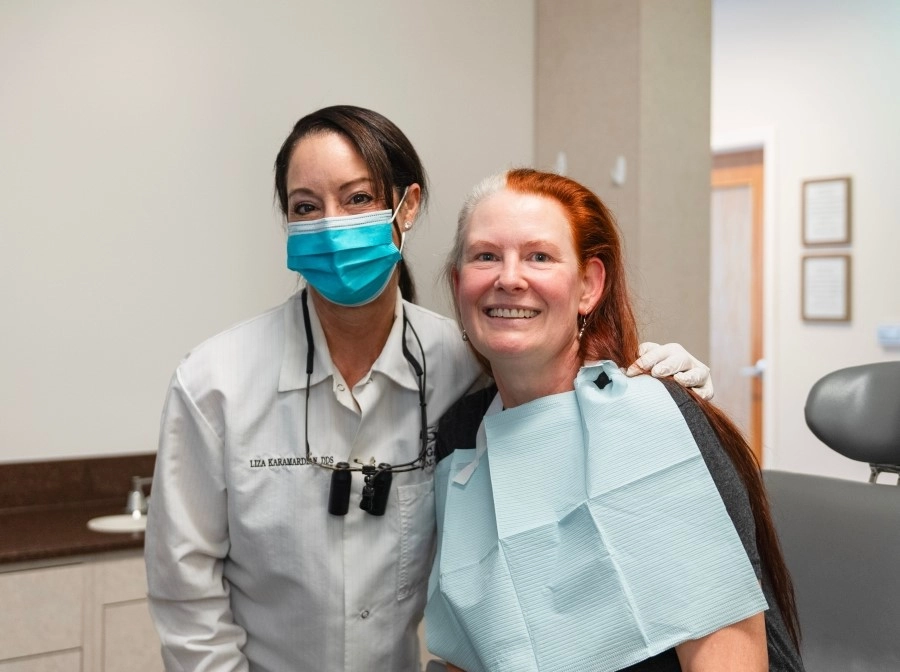
Why Choose Los Gatos Dental Group for Dental Implants?
- All Your Implant Care in One Trusted Place
- Specialized Expertise You Can Feel Confident In
- Advanced 3D Imaging for Safe, Precise Planning
What are Dental Implants?
Dental implants are small titanium posts placed into your jawbone to act as artificial tooth roots. Once they integrate with your bone, we top them with custom restorations (crowns) that look, feel, and function like natural teeth.
Unlike traditional options, implants don’t just replace what’s missing on the surface—they rebuild from within.
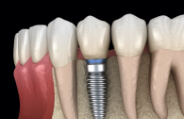
Missing One Tooth
For a single missing tooth, we can fill the gap in your smile by placing a single dental implant beneath the gumline and into the jawbone. Once it fuses with the bone, we’ll place an abutment onto it that will secure a customized dental crown in place.
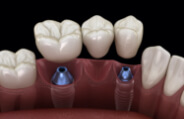
Missing Multiple Teeth
Instead of receiving a traditional bridge that requires the alteration of your existing, healthy teeth, we can secure a bridge to two dental implants placed on either side of the gap in your grin. We can also secure a partial denture to implants as well!
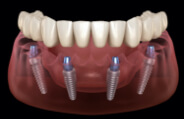
Missing All of Your Teeth
Are you tired of unstable traditional dentures that make eating and speaking a hassle because they slip and shift when you open your mouth? We can secure a denture to anywhere from four to eight dental implants that we place below the gumline to provide a strong foundation for your prosthetic.
Benefits That Go Beyond the Surface
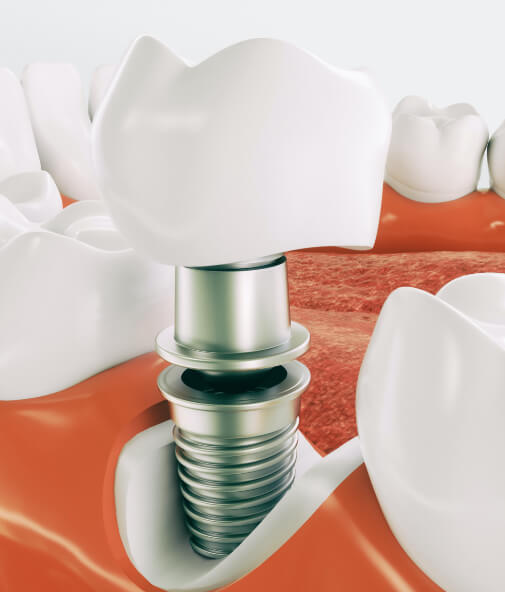
- Stunning results
- Seamlessly natural look and feel
- No dietary restrictions – eat what you love
- Stain-resistant and highly durable
- Protects jawbone and facial shape
- Long-term value and reliability
- Designed and placed with expert precision
- Completed right here, from start to finish
Am I A Candidate for Dental Implants?

If you're missing one or more teeth—or facing the possibility—you may be a good candidate for implants. Healthy gums and sufficient bone are ideal, but even if you've been told "no" before, new techniques like bone grafting may open the door.
We'll evaluate everything at your consultation, so you know exactly what’s possible.
Why Choose Implants Over Bridges or Dentures?
- No compromise to surrounding teeth. Bridges require adjacent teeth to be filed down; implants stand independently.
- More stability. Dentures may shift or slip—implants stay anchored for confidence with every bite and word.
- Preserve your bone and facial structure. Implants stimulate the jawbone, helping prevent the bone loss that often follows tooth loss.
- Longer-lasting. With proper care, implants can last a lifetime, unlike bridges or dentures which often need replacement every 5 - 10 years.
- Feel like real teeth. No clicking, no adhesives; just natural chewing, smiling, and speaking.
Not sure what’s best for you?
We take the time to help you understand every option so you can feel informed and empowered in your decision. For most patients, implants offer unmatched comfort, longevity, and confidence, but you might still like to go with bridges or dentures for other reasons.
Our Process:
Precision, Comfort, Clarity
Our Process:
Precision, Comfort, Clarity
Step 1: Let’s Talk
We begin with a thoughtful, pressure-free consultation. You’ll share your story and your goals, and we’ll listen closely. Keep in mind that you may need preparatory treatment, like a bone graft or gum disease therapy.
Step 2: See What’s Possible
Using advanced 3D imaging, we’ll assess your bone health and show you a clear view of what your smile could look like after treatment.
Step 3: Expert Placement
Dr. Diercks has completed specialized training on the placement and restoration of dental implants, allowing our team to complete the entire process under one roof. You won’t have to worry about bridging communication between specialists or having to work with a team that you’re not familiar with.
Step 4: Healing and Integration
Your implant gradually fuses with your jawbone over a few months. We provide a comfortable temporary restoration during this time so you don’t have to go without a smile!
Step 5: Your Final Smile
Once healed, we place your final crown, bridge, or denture – custom-crafted to beautifully match your smile.
What Recovery Really Looks Like
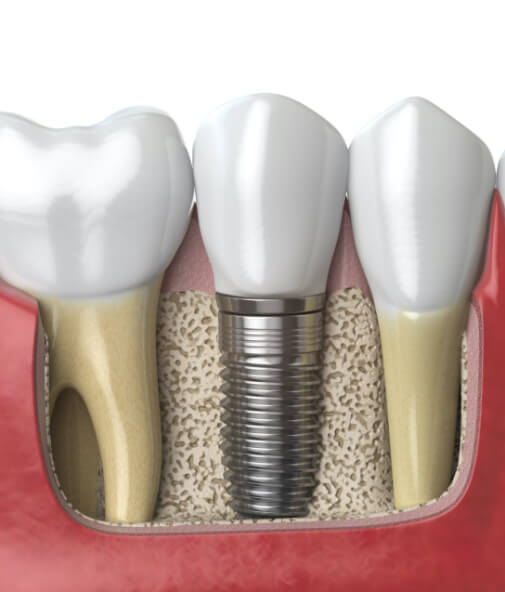
Most patients are surprised by how smooth recovery feels. Mild tenderness and swelling are common for the first few days and can be managed easily with over-the-counter medication. You'll likely return to your normal routine within a day or two.
We Will:
- Provide clear aftercare instructions
- Check in with you closely
- And stay available every step of the way
Our team is known for being exceptionally responsive and kind, and we take that commitment seriously.
Why Choose Us?
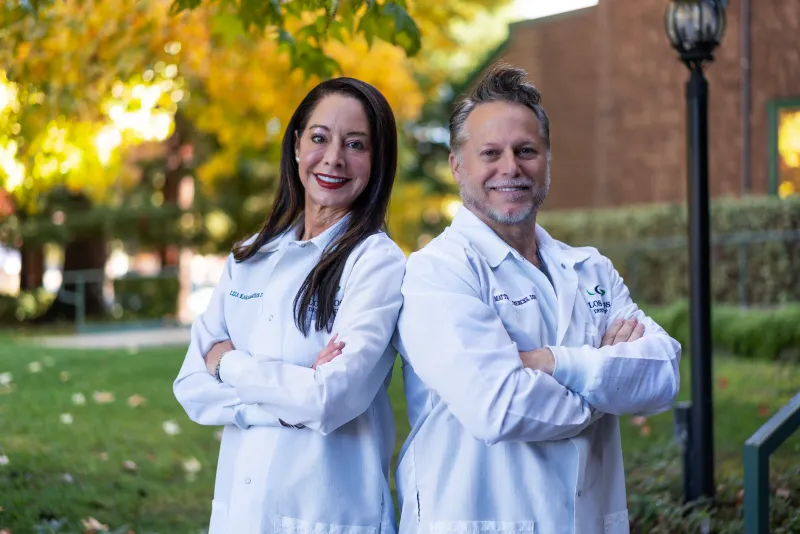
We aren’t a high-volume implant center. We’re a relationship-driven practice, where your experience matters just as much as your outcome. With advanced technology, refined skill, and a dedication to comfort and clarity, our team delivers world-class care with a human touch.
We’re proud to be a place where patients feel safe asking questions, where nothing is rushed, and where the details are never overlooked.
Understanding The Cost of Dental Implants
Because every treatment is unique, the cost of dental implants depends on factors like the number of teeth you're replacing, the type of restoration needed, and whether preparatory care (such as bone grafting or gum therapy) is recommended for success.
Dr. Diercks will walk you through every detail during your consultation, so you know exactly what to expect.
To keep care accessible, we partner with CareCredit®, offering flexible monthly payment options that fit your budget – so you can prioritize your health without added stress. Our team is happy to walk you through your options and help you get started.
Apply For CareCreditFreedom At Last
Replacing a missing tooth is about more than function – it’s about freedom. The freedom to eat, laugh, and show up in your life fully. Let’s bring back what you’ve been missing. Book your appointment today!
Schedule Your ConsultationYour Questions, Answered
Is the implants procedure painful?
Not at all. With local anesthetic and gentle care, discomfort is minimal – and recovery is often quicker than expected.
How long do implants last?
The implant itself can last a lifetime. The crown or denture may eventually need replacement, but typically not for 10–15 years.
What if I’ve lost bone?
We can explore bone grafting or use advanced implant designs. You may still be a candidate even with previous bone loss.
What if I’ve lost bone?
We can explore bone grafting or use advanced implant designs. You may still be a candidate even with previous bone loss.
Are dental implants hard to take care of?
No! Dental implants are similar to the structure of your natural teeth, so you care for them in almost the exact same way.
Does dental insurance cover dental implants?
Unfortunately, dental insurances rarely cover the cost of dental implants – they still consider the procedure to be “cosmetic,” despite its ability to preserve jawbone density and improve overall oral health and the complete function of the mouth.
Our team will happily file claims on your behalf and help you maximize any benefits that you may have for this procedure. In some cases, insurance companies may cover a portion of the cost of the restoration or any sedation required, but that depends on your specific coverage.